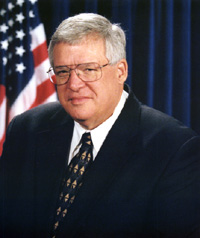Structuring and Dennis Hastert: Is This Case Setting a Precedent for Prosecutorial Overreach of Your Rights?
Yesterday, Dennis Hastert pled not guilty to criminal charges that were filed against him on May 28, 2015, in the United States District Court for the Northern District of Illinois, Eastern Division, in Case No. 15-CR-315.
Read the Indictment which was placed into my Digital Library for further reference here:
Counts in the Indictment: What’s Hastert Charged With Doing?
There are two counts in the Hastert Indictment: he’s only being charged with two (2) criminal acts of wrongdoing. The first count is for violation of 18 USC Section 1001(a)(2) and the second count is for violation of 31 USC Section 5324(a)(3).
1. 18 USC 1001(a)(2) (False Statements)
This is a federal law that outlaws false statements; in the exact language of the statute, it is illegal to make “… any materially false, fictitious, or fraudulent statement or representation.”
2. 31USC 5324(a)(3)(Structuring)
This is the federal structuring law, which prohibits anyone from “… structure or assist in structuring, or attempt to structure or assist in structuring, any transaction with one or more domestic financial institutions.”
Dennis Hastert is alleged in the indictment to have violated federal structuring laws and then to have violated federal law by making false statements to investigators who were investigating the possibility that he had violated federal banking laws by structuring his checking account transactions. If convicted, he faces a maximum of 5 years imprisonment and a $250,000 fine.
So, this means that we have a STRUCTURING CASE here.
What is Structuring?
For details on how structuring works, check out my In-Depth Article on Structuring, “Structured Cash Deposits: What Do I Do When The IRS Cid Agent Comes?” I’ve written this explanatory article on how federal structuring cases work because way too many ordinary citizens running Mom and Pop businesses have been getting their bank accounts wiped out by the federal government on bogus structuring charges.
Bogus? Yes: lots of small businesses run on cash sales of anything from food at restaurants to people who like to pay in cash for their dry cleaning. These business folk don’t know that their cash deposits may run afoul of federal banking laws designed to catch money laundering schemes.
All too often, they discover federal “structuring” laws after they learn all their money has been taken by federal investigators out of their account. More on their stories here. Back to Hastert.
Hastert Pleaded Not Guilty Yesterday
Yesterday, Dennis Hastert appeared before U.S. District Judge Thomas Durkin and entered a plea of not guilty to both counts of the indictment. This means that the prosecution must now go forward and prove their case. Which is a federal structuring case.
He was released on a $4500 bond and he was ordered to surrender his passport and any firearms he owns within the next two weeks, as well as being ordered to provide federal investigators with a DNA sample and to avoid other individuals who might be connected in some way with the criminal allegations.
The Surrounding Dennis Hastert Scandal
Of course, most people aren’t following this case as an allegation that the former Speaker of the United States House of Representatives has violated federal banking laws that have been created to fight money laundering in this country.
The big deal about the Hastert story is all about sex.
It’s a sex scandal, even though there’s no sex crimes in that indictment whatsoever. None. And there are not any corresponding Illinois state law charges filed and pending against Hastert either.
The indictment hints of this scandal in its descriptions of “past misconduct” that were the incentive for Hastert to make the payments which are now the subject of the structuring case. According to the indictment (page 7), between July 2012 and December 2014, Dennis Hastert withdraw a total of $952,000 from accounts at four different banks, in a series of 106 withdrawals none of which exceeded $10,000.00.
The rest of the story has been bubbling up out of media investigations as well as tabloid coverage and social media gossip.
It’s an old story based on events that happened many years ago. According to all these sources, Dennis Hastert was involved in a sexual relationship with a young man back when the 73-year-old defendant was a teacher and coach at an Illinois high school. The payments are said to be “hush money” to prevent that relationship from becoming public knowledge.
The statute of limitations has passed for any state prosecution of state sexual crimes since these events are alleged to have occurred back in the 1970s.
There’s nothing nice here. Many folk dislike and distrust Hastert because he was a career politician. Doesn’t get better when Hastert’s story continues as a fat cat lobbyist who got rich up in Washington after he stopped being Speaker of the House. Then, the story breaks that this guy was paying a man off with lots of money to keep quiet about their sexual encounters when that man was a student back in high school and Hastert was his teacher and coach.
The scandal is that the former Speaker of the House of Representatives may have been a child molester who paid almost a million bucks to his victim to keep his mouth shut about what happened back in the 1970s. That’s a horrible story, no wonder we’re seeing all this media coverage.
Of course Hastert is easy to cast as a bad, bad man — you gotta wonder who would play him in a TV Movie. Dennis Hastert is a big challenge for a criminal defense lawyer who’s considering the perceptions of a jury.
Using Structuring Law to Force a Defendant to Take a Plea Because They Cannot Prove Their Case?
But here’s the thing: we’re not dealing with sex crimes here.
All these scandal stories are making the pressure build for the defendant to negotiate a plea deal with the prosecution. However, if you look at the indictment itself this is NOT a sex crimes case.
Go back, re-read the whole thing.
This is a case alleging violation of federal banking laws and these structuring cases are notorious at this point for their misuse. Too many people are getting in trouble and having their bank deposits confiscated by the federal authorities under a law that makes it illegal to have routine bank transactions that are close to $10,000 (deposits or withdrawals).
What we should all be concerned about here is that precedent may be set here where the federal banking laws outlawing structuring are being used to pressure an individual to take a plea deal when there is no indictment on the underlying, bigger concern – which is sexual misconduct in Hastert’s case, but could be any number of kinds of alleged wrongdoing in future federal investigations.
Consider the arguments made in the recent article in the Atlantic by Conor Friedersdorf, “Why Is It a Crime to Evade Government Scrutiny? Prosecutors may suspect Dennis Hastert of serious misconduct, but charging him with trying to avoid surveillance risks criminalizing harmless behavior.”
It is important that we do not miss the point here: if the federal authorities cannot find sufficient evidence of a crime, no matter how sordid, then are we okay with them using structuring laws to arrest and then pressure someone to take a plea deal on the structuring case?
If the government lacks enough proof to arrest or indict on the underlying conduct, then should this tactic be allowed? Is this prosecutorial overreach?
______________________
For more information, check out our web resources page and Michael Lowe’s Case Results including this case result in a recent structuring charge out of Dallas.
Comments are welcomed here and I will respond to you -- but please, no requests for personal legal advice here and nothing that's promoting your business or product. Comments are moderated and these will not be published.





Leave a Reply